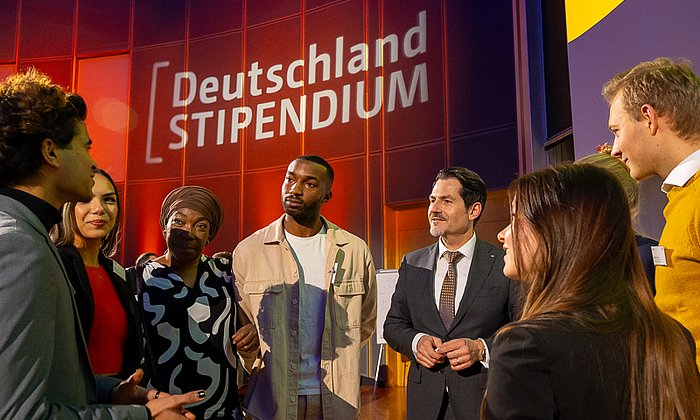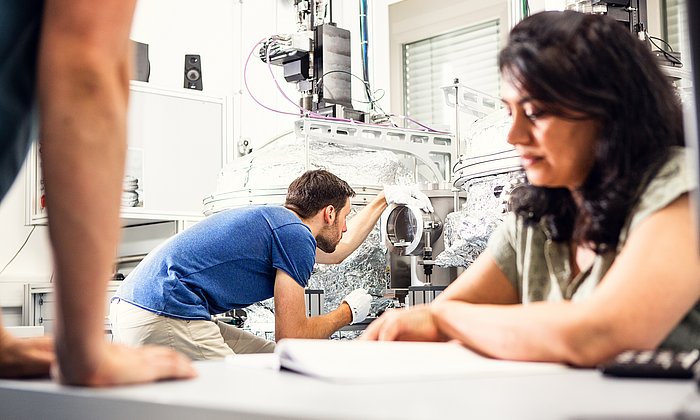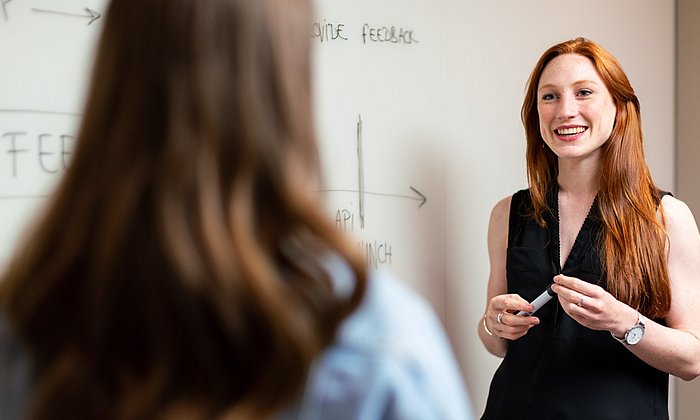Portrait of Master's student Nektarios Totikos
"Education can work wonders"

Nektarios Totikos wrote email after email, and each one was rejected. Then, after the tenth attempt, the good news arrived: He had been accepted to write his Master's thesis at the renowned Massachusetts Institute of Technology (MIT) in the USA. The plane left for Boston in July 2023. "I see everything as a challenge, I stay focused," says Nektarios Totikos in an online interview, smiling into the camera. Drab concrete walls in the background, the occasional whirr of the air conditioning, a conference room like any other. Nevertheless, he's thrilled: "This is a dream come true."
Nektarios Totikos has done a lot to make his dream come true: He has always been a hard-working student and graduated from German high school with excellent grades. After earning his Bachelor's degree at the University of Stuttgart, he was accepted to the Master's program in Electrical Engineering and Information Technology at TUM, and specialized in Artificial Intelligence. And now comes MIT. "I always knew that I wanted to study at university," says the 27-year-old, "My interest in learning saved me."
Totikos is referring to the difficult conditions he faced growing up in eastern Stuttgart, "a classic problem area where many families live in poverty." His mother raised Totikos and his older brother alone. "I think we were too much for her and for various reasons she couldn't do much to support our education," says Totikos today. "But I had a lot of freedom, which was very valuable." He spent a lot of time hanging around the housing project, with the neighborhood kids or alone. "I enjoyed observing nature and my whole environment. It was all about gathering impressions and learning from them."
Growing up quickly
When Nektarios Totikos was ten, his mother decided to move with her sons to Greece, where she had spent part of her own childhood. The children were uprooted from their familiar surroundings and missed school for two months, recounts Nektarios Totikos. He wanted to return to Germany, where he was recommended to attend university-track secondary school. With the help of a neighbor friend from Stuttgart, he managed to return; the neighbor cared for him and later for his brother as well.
But the children couldn't stay with their neighbor permanently and were sent to a child and youth welfare facility. At 16, he moved into a supervised group home: Cooking, cleaning, and studying for his A-levels – He and his roommates independently mastered tasks for which most young people have the help of their parents. "I had to grow up very quickly," says Totikos today. "After leaving the youth welfare system, many care leavers are on their own."
Care leavers are young people and adults who have spent part of their lives in child and youth welfare facilities – for example, in a supervised home or foster family. In 2021, the German Federal Statistical Office put the number of young people living outside their families at around 210,000.
Without a safety net
In addition to the lack of financial support from their parents, these young people sometimes have no social network either. "I would have liked someone to discuss my plans with and support me with applications." For example, with his cover letter for the Molecular Medicine program at the University of Tübingen, he says. "I naively assumed that my secondary school grades would be enough and I didn't have anyone to proofread my application." Totikos was rejected and decided to study Electrical Engineering and Information Technology in Stuttgart.
He met a handful of friends at the University of Stuttgart without whom he would probably not have been able to complete his studies, he says. He went to TUM with some of them for the Master's degree program and became involved in the student initiative TUM.ai. The initiative connects students in areas related to artificial intelligence, carries out projects and organizes workshops. Today, the former lone fighter, who wanted to prove to everyone that he could make it on his own, now appreciates working in a team: "You support and motivate each other because you want to grow together. That helps you formulate goals that didn't even seem possible before."
This is a dream come true.
Master's student
Research on emotion recognition
One such goal was writing his Master's thesis at one of the world's best-known technical universities: At MIT's Sloan School of Management, Nektarios Totikos works together with Master's students from various disciplines to investigate how sensitively plants react to human emotions. When basil plants perceive strong feelings such as joy or fear in their immediate surroundings, they emit electrostatic signals, he explains. The team wants to use these signals to draw conclusions about people's moods and to use this knowledge to improve people's working environment, for example. Totikos is responsible for the self-learning algorithm that is to predict the employees' emotions.
"I grew up thinking that I'm valuable as a person as long as I have good grades. That was a protective mechanism," says Totikos. He now feels that grades aren't the most important thing and that life isn't just about a career. That's why, after his Master's thesis he wants to take time to think about what he wants to do next professionally and, if he has enough money, to travel along the East Coast of the USA. "Now, for the first time, I can take a break. Everything has fallen into place and I'm extremely grateful for that."
Encouraging others
Nektarios Totikos didn't talk about his childhood and youth for a long time. Now, he would like to use his story to encourage others to hold on to their dreams. Especially people who grew up like him, people who come from difficult backgrounds and who are still by and large neglected on the political level, he says. "There are definitely not equal opportunities for everyone. Many people work hard and yet are still denied opportunities. But I'm convinced that education can work wonders. It can help to make dreams come true – and I wish the same for others."
Nektarios Totikos is supported by a Federal Training Assistance Act (BAföG) foreign student grant and a Rotary scholarship.
Support for young talent at TUM:
- For more than ten years, the Deutschlandstipendium student grant program has funded young people throughout Germany with very different paths in life. Around 6,000 students have been supported so far at TUM alone.
-
The Agnes Mackensen Program at TUM is intended for women, intersex, non-binary, trans and agender people (FINTA*) with non-academic parental backgrounds. It offers workshops and provides mentors to help them make their way at university and advance their careers.
Technical University of Munich
Corporate Communications Center
- Undine Ziller
- undine.ziller@tum.de
- presse@tum.de
- Teamwebsite



